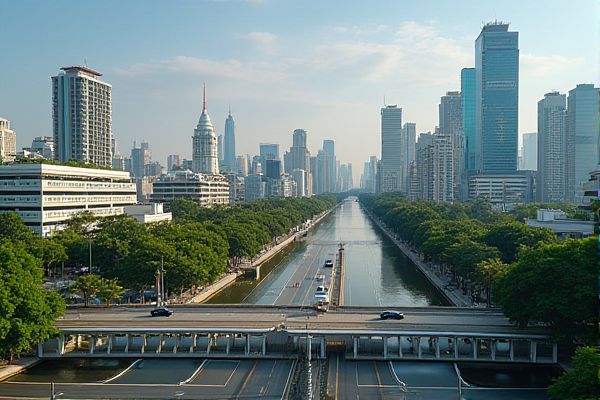
Local laws and regulations in Thailand: Visa and immigration requirements. Work permit regulations. Foreign business ownership rules. Housing and property laws. Labor laws and employee rights. Traffic rules and driving licenses. Taxation and income reporting. Alcohol sales and consumption rules. Environmental and conservation regulations. Intellectual property regulations.
Visa and immigration requirements
To enter Thailand, visitors must comply with specific visa and immigration requirements, including obtaining a Tourist Visa, Visa on Arrival, or utilizing the Visa Exemption program, each with its own set of documents and stay limitations, such as a valid passport, proof of financial stability, and onward travel tickets. For more detailed information about these requirements, visit the Thailand Tourist Visa page, which outlines the necessary steps and conditions to ensure a smooth entry into Thailand.
Work permit regulations
To work in Thailand, foreigners must obtain a work permit, which requires a non-immigrant visa, specific documents from both the employer and the foreigner, and approval from the Ministry of Labor. The work permit specifies the job and employer, is typically valid for one year, and must be renewed before its expiry date. For more detailed information, anyone interested in pursuing employment can visit the website for Thai work permit requirements.
Foreign business ownership rules
In Thailand, foreigners can own up to 49% of a company without special permission, but to own more than 49%, they must obtain a Foreign Business License (FBL), qualify for a Board of Investment (BOI) promotion, or register under the Treaty of Amity if they are US citizens. Certain business activities are restricted or prohibited for foreign ownership under the Foreign Business Act, with specific exemptions and requirements for each method of achieving 100% foreign ownership.
Housing and property laws
In Thailand, foreigners are generally prohibited from owning land, but they can own condominium units up to 49% of the total area, use leasehold agreements, or establish a Thai Limited Company to indirectly own land. Real estate transactions are governed by the Civil and Commercial Code and the Land Code, with strict regulations and requirements for registration and ownership verification. For more comprehensive insights into the legal framework governing these transactions, visit the Global Corporate Real Estate Guide on the Baker McKenzie website.
Labor laws and employee rights
Thailand's labor laws, governed by the Thai Labor Protection Act, mandate maximum working hours of 8 hours per day and 48 hours per week. They ensure compliance with minimum wage standards and provide for annual, sick, and maternity leave while protecting employees against discrimination and unfair termination. Recent updates in these laws have enhanced severance pay and maternity leave benefits. Employers are required to maintain detailed employee records and adhere to strict regulations to avoid penalties. For a more comprehensive understanding of these laws, visit the Labor Law of Thailand page.
Traffic rules and driving licenses
If you plan to drive in Thailand, it is crucial to have either a Thai driver's license or an International Driving Permit (IDP), as driving with a license from your home country is illegal. Adhering to local traffic rules is mandatory, which includes driving on left-hand traffic, following specific overtaking regulations, and respecting speed limits typically set at 60 km/h in populated areas and 110 km/h on highways. For comprehensive details and guidance on navigating these requirements, you can refer to ExpatDen's guide on driving in Thailand, ensuring you are well-informed and compliant with local laws.
Taxation and income reporting
In Thailand, starting January 1, 2024, citizens and residents, including foreigners residing in the country for 180 days or more, are mandated to pay income tax on all earnings, whether generated domestically or internationally, if such income is brought into Thailand. The tax rates vary between 0% to 35% depending on the annual income bracket. It is essential for individuals to file their tax returns by March 31 of the subsequent year to avoid penalties. For a comprehensive understanding of these new regulations, you can refer to the Thailand New Tax on Foreign Income Overview provided by Siam Legal. This will ensure that all taxpayers are well-informed and compliant with the new tax requirements.
Alcohol sales and consumption rules
In Thailand, alcohol sales are strictly regulated, allowing purchases only between 11:00 AM and 2:00 PM, and from 5:00 PM until midnight. The legal drinking age is set at 20 years, ensuring that only adults can partake in alcoholic beverages. Specific locations such as temples, public offices, and parks are designated no-alcohol zones where its sale or consumption is prohibited. Furthermore, there are additional restrictions imposed on certain Buddhist holidays. For more detailed insights into these regulations, you can visit the Thailand Alcohol Rules page for comprehensive information.
Environmental and conservation regulations
Thailand's environmental and conservation regulations are undergoing significant updates with key legislation such as the Enhancement and Conservation of National Environmental Quality Act. This Act incorporates essential environmental principles like prevention, precautionary, and polluter pays principles. The new drafts aim to extend applicability to broader areas including the continental shelf and high seas. Additionally, revisions to pollution control mechanisms are being proposed, focusing on enhancing standards and the public disclosure of pollution data. For a deeper understanding of these developments and their implications for a more sustainable future, visit the Global Compliance News website.
Intellectual property regulations
Thailand protects intellectual property through various laws, including the Patent Act, Trademark Act, and Copyright Act, administered by the Department of Intellectual Property. Registration is crucial for trademarks and patents, while copyrights are protected by law without registration. Other IP rights, such as geographical indications, trade secrets, and semiconductor topography rights, are also regulated effectively.
